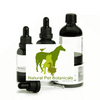

Feline Urinary Comfort & Health - Set of 2

Feline Urinary Comfort & Health - Set of 2
Cat Urinary Balance & Wellbeing
A cat’s urinary health is closely linked to hydration, comfort, and natural balance. Supporting the urinary system can encourage ease and flow, while also contributing to overall wellbeing.
Gentle approaches traditionally associated with urinary comfort often focus on maintaining balance, soothing the system, and promoting calmness. This includes attention to hydration, a supportive environment, and natural supports that encourage harmony within the body.
Everyday care that nourishes balance can help your cat feel more comfortable, resilient, and at ease.
Natural Pet Botanicals Recommendations formulas are both effective and gentle in supporting the whole body, you support your own animal or pet at home, and in almost every single case we improve vitality and longevity. If you are dealing with any metabolic or immune issue with your pet, we suggest that you contact us for a consultation so we can ensure you are using the right products.
1. Cysto Clear 14 formula 30ml
2. Bladder Balance 319 50ml
Contains:
Formula 1.
Bearberry (Uva ursi 50M) – Traditionally associated with urinary tract comfort and balance
Yellow Jasmine (Gelsemium 12C) – Traditionally regarded for supporting relaxation and ease in urinary function
Shepherd’s Purse (Thlaspi bursa 30C) – Traditionally linked with healthy urinary flow and balance
Terebinthina (Oleum terebinthinae 12X) – Traditionally associated with soothing and restorative qualities for the urinary system
Common Barberry (Berberis vulgaris 200C) – Traditionally regarded for natural urinary balance and resilience
Tabacum (1M) – Traditionally linked with comfort in the urinary system and natural relaxation
Cantharis (1M) – Traditionally associated with soothing urinary discomfort
Pure Flint (Silicea 200C) – Traditionally regarded for supporting bladder balance and tone
Goldenseal (Hydrastis 10M) – Traditionally linked with resilience and balance in urinary wellbeing
Stavesacre (Staphysagria 1M) – Traditionally associated with balance and support for urinary comfort
Potassium Chlorate (Kali chloratum 12X) – Traditionally regarded for maintaining internal balance and vitality
Cuttlefish Ink (Sepia 30X, 200X) – Traditionally linked with natural support for bladder tone and function
Goldenrod (Solidago 200C) – Traditionally associated with kidney and urinary tract balance
Wild Liquorice (Sarsaparilla 200C) – Traditionally regarded for soothing and supportive qualities in urinary wellbeing
Fresh Root Bark of Betula Shrub (Rhus aromatica 10M) – Traditionally linked with bladder tone and balance
Fragrant Sumac (Rhus aromatica 200C) – Traditionally associated with maintaining balance and comfort in the urinary system
Bearberry (Uva ursi 6X) – Traditionally regarded for urinary tract support and vitality
in 20% USP alc. in purified water.
Reference: https://pubmed.ncbi.nlm.nih.gov/30637820/
Reference: https://pubmed.ncbi.nlm.nih.gov/32683037/
Reference: https://www.ncbi.nlm.nih.gov/pmc/articles/PMC7761148/
Formula 2
Purple Coneflower (Echinacea) – Traditionally associated with immune vitality and regarded for supporting natural resilience
in purified water & 30%-40% USP alc.
Reference: https://www.health.com/echinacea-benefits-7570763
Dandelion Leaf (Taraxacum officinale) – Traditionally linked with balance in fluids and gentle support for liver and digestive wellbeing
Alfalfa (Medicago sativa) – Traditionally regarded for nourishment, vitality, and overall system balance
References: https://www.verywellhealth.com/urinary-tract-infections-symptoms-2328460
https://www.verywellhealth.com/health-benefits-of-alfalfa-4584280
Yarrow Flower (Achillea millefolium) – Traditionally associated with balance in circulation and regarded for its soothing, harmonising qualities
Uva Ursi (Arctostaphylos uva-ursi) – Traditionally regarded for maintaining urinary tract comfort and balance
Reference: https://draxe.com/nutrition/uva-ursi-bearberry/
Chamomile (Matricaria chamomilla) – Traditionally linked with calm, comfort, and gentle balance in the system
Nettle (Urtica dioica) – Traditionally associated with natural vitality and regarded for its balancing effects on fluids and elimination Reference: https://www.drweil.com/vitamins-supplements-herbs/herbs/stinging-nettle/
Ginseng (Panax ginseng) – Traditionally linked with resilience, energy, and natural balance
Reference: https://bebetternow.com/blog/bladder-control/frequent-urination/the-6-best-herbs-for-bladder-health
Red Clover (Trifolium pratense) – Traditionally regarded for circulation, cleansing, and balance in wellbeing
Violet Leaves (Viola odorata) – Traditionally associated with natural cleansing and blood vitality
Reference: https://drhealthbenefits.com/herbal/leaves/health-benefits-violet-leaves
Cordyceps (Cordyceps sinensis) – Traditionally linked with vitality, energy, and natural stress resistance
Cornsilk (Zea mays) – Traditionally regarded for gentle urinary comfort and balance
References: https://cmjournal.biomedcentral.com/articles/10.1186/s13020-024-00884-3
https://www.webmd.com/urinary-incontinence-oab/features/herbal-remedies-overactive-bladder
Cryptolepis (Cryptolepis sanguinolenta) – Traditionally associated with resilience, cleansing, and natural balance
Reference: https://cmjournal.biomedcentral.com/articles/10.1186/s13020-024-00884-3
Andrographis (Andrographis paniculata) – Traditionally regarded for resilience, vitality, and balance in wellbeing
Reference: https://draxe.com/nutrition/andrographis/
Juniper (Juniperus communis) – Traditionally linked with digestive balance, vitality, and natural cleansing properties
Goldenseal (Hydrastis canadensis) – Traditionally associated with supporting natural resilience and balance
Agrimony (Agrimonia eupatoria) – Traditionally regarded for circulation and balance in liver and urinary wellbeing
Reference: https://www.asohm.com.au/agrimony-a-small-herb-with-mighty-power/
Rehmannia (Rehmannia glutinosa) – Traditionally associated with vitality, balance, and replenishment of energy
in 20% USP alc. in purified water.
Need more advice or have more questions? Contact us for a FREE consultation with one of our fully qualified practitioners.
These statements are for general wellbeing and educational purposes only. This product is not intended to diagnose, treat, or prevent any disease. Always seek veterinary or professional advice for specific health concerns.
DISCLAIMER
The statements made regarding these products have not been evaluated by the Food and Drug Administration. The efficacy of these products has not been confirmed by FDA-approved research. These products are not intended to diagnose, treat, cure or prevent any disease. All information presented here is not meant as a substitute for or alternative to information from your health care practitioners. The Federal Food, Drug, and Cosmetic Act require this notice.










